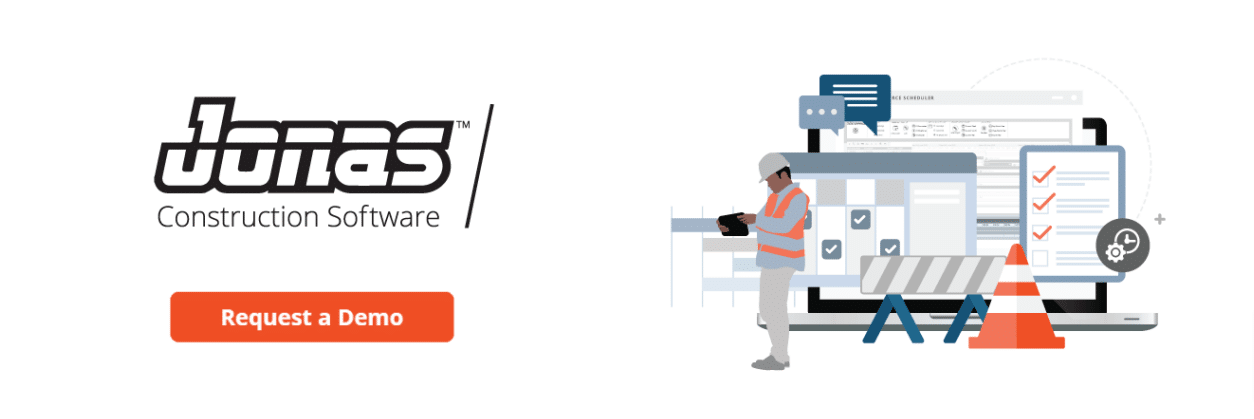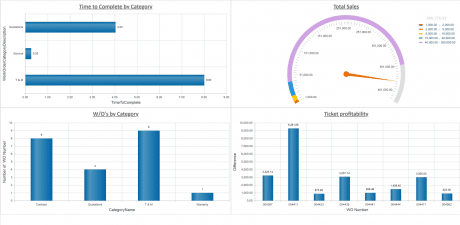Last Updated on July 15, 2024
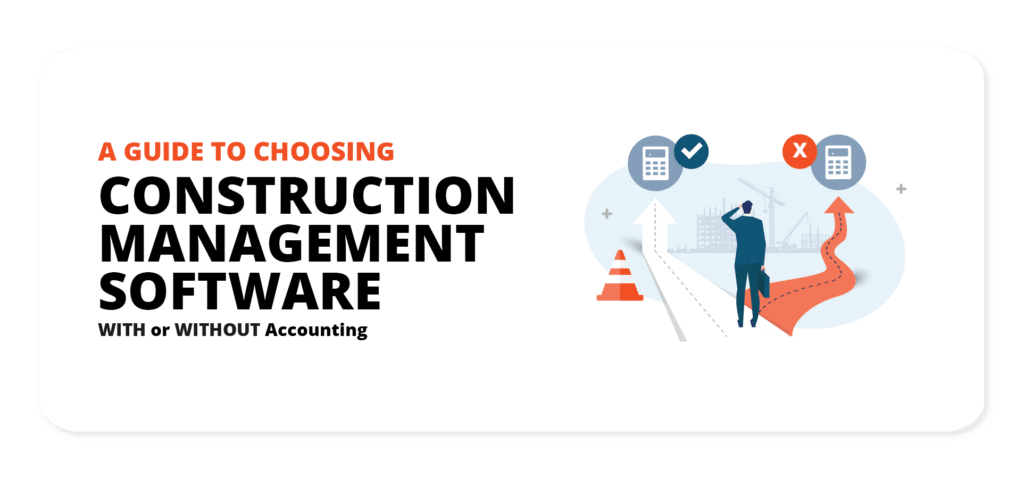
While service and construction management software can streamline business operations and enhance efficiency for both the back office and field teams, finding the right software for your business may not be as simple.
With so many different functionalities and options to consider, finalizing a service and construction management software will likely require a collaborative effort from your management team and staff.
Many construction professionals would consider accounting to be one of the most important aspects of a job or work order, and necessary for maintaining a profitable business. Because of this, businesses may choose to purchase accounting software first before purchasing any other business software. Under accounting functionalities, companies track expenses, review reports, and categorize their job cost to determine future budgets and job profitability.
As these businesses expand and evolve, they may find that the accounting software they started with is insufficient for managing the business’ complexities and day-to-day operations, requiring them to seek specialized construction software like construction management software or construction accounting software. In this article, we will examine service and construction management software with and without accounting functionality to help you choose the right construction software so that you can mitigate your risk and maximize profit.
In order to fully appreciate the differences, it’s important to review what you should expect with either construction management software or construction accounting software. That said, if you’d like to jump ahead, we suggest heading to sections 6 and 7.
- What is Construction Management Software?
- The 10 Construction Management Features You Need to Know
- What is Construction Accounting Software?
- What Makes Construction Accounting Software Unique?
- Common Construction Accounting Features
- The Benefits of Construction Management Software with Accounting
- The Benefits of Construction Management Software without Accounting
- Summary – Which Option Is Right For Me?
What is Construction Management Software?
Service and construction professionals use construction management software to streamline and track business processes in the office and the field, from planning and scheduling to resource allocation and cost control.
An effective construction management software will sync the business’ day-to-day tasks to provide an accessible, shared space of information on all jobs, services, and projects. With the integration of finance, inventory management, and scheduling, the delivery of well-executed projects and/or services can be greatly improved. As a result, businesses can also enhance their profitability and scalability.
How to Choose Construction Management Software
Beyond boosting productivity and efficiency, service and construction management software offers a competitive edge to businesses with its suite of integrated features. Tasks that were previously manually entered or completed on paper can now be automated and expedited with service and construction management software.
As the construction industry becomes increasingly competitive and met with other economic challenges like labor shortages, businesses are recognizing the need to leverage integrated solutions. This is reflected in the market forecasts for construction management software, which is projected to grow significantly at a CAGR of 9.3%, from USD 8.90 billion in 2023 to USD 13.90 billion by 2028.
But, with a wide range of service and construction management software options available, how do you choose the right construction management software for your business needs?
Top 10 Construction Management Software Features
Here are the 10 most critical features that create a robust and comprehensive service and construction management software core.
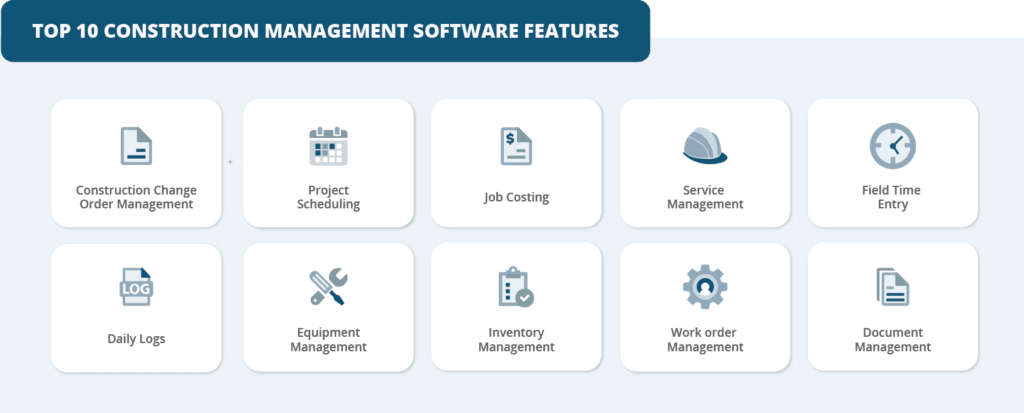
- Construction change order management: Track and manage change orders in real-time, contemplate change notices and view the impact of change orders on your project timelines. This feature ensures that any modifications in the project scope, schedule, or costs are accurately integrated into the project plan so that you can maintain the project’s alignment with its original objectives.
- Project scheduling: With better scheduling, you can avoid project delays by arranging the tasks in the right order, allocating equipment and workforce across multiple projects, and laying out a project timeline in order to predict critical inter-dependencies of labor and equipment.
- Job costing: With accurate job cost reports, you can better assess profitability on a job and cash flow by tracking your costs and comparing your estimates vs. actual costs in real-time. This feature also helps to break down the cost of materials, labor, and overhead.
- Service management: Optimize your service business by having a centralized place to manage and dispatch work orders and produce schedules. This feature allows for an efficient allocation of assets and construction equipment and also better management of your technicians.
- Field time entry: Timely and accurate timesheet tracking makes it easy for your field staff to enter hours and details about the job. With this feature, you can automate labor hour approvals and control hours and dollars straight from the field.
- Daily logs: Keep track of project details right from the job site. With this feature, you will feel secure knowing you’ve got a reliable record of all the events and activities on site. With daily logs, you can minimize mistakes and document everything as it happens in the field.
- Equipment management: This feature lets you track and maximize your equipment usage. Assess equipment profitability and track revenue on projects and work orders. You can also charge equipment costs to jobs and work orders, track rented equipment, and record depreciation to understand your equipment value better.
- Inventory management: Maintain full control over stock and materials across multiple storage locations. With materials management, manage the intricacies associated with maintaining job costs, optimal stock levels, and effective reporting. This feature can help you keep the inventory organized with seamless integration to your purchase orders, counter sales, jobs, work orders, equipment, and general ledger.
- Work order management: Improve your cash flow by streamlining your service work order management. Quickly create, dispatch, and bill work orders and get paid faster. This feature helps to eliminate piles of paperwork and double-entry errors that are inevitable in paper-based work order management processes.
- Document management: This feature helps you stay organized, save time, and reduce paper waste. A centralized document management system also improves collaboration between departments, helping you share the latest version of any document at any time.
Construction software also provides a better insight into projects, statuses, and overall business profitability and efficiencies. With robust service and construction management software, businesses should be able to produce reports to enhance decision-making and summarize data to help identify areas that are at risk, underperforming, or falling behind schedule.
Among the reports available on service and construction management software, financial reporting may be one of the most important. After all, detailed and timely reports can help you monitor your job and project performance, track job costs, improve job profitability, and better manage cash flow.
With that being said, it is evident that having accurate financial data is critical to your reporting, and that’s when accounting software for construction companies plays a significant role.
What is Construction Accounting Software?
Accounting software for construction businesses is a purpose-built solution to track money coming in and out of the business. It integrates general accounting features with a job costing module to track project costs and revenues, payroll management, and control billing and procurement.
Many business owners view accounting as nothing more than an administrative headache. Nevertheless, good construction accounting tools and practices are essential for managing a profitable business. In fact, the North American construction accounting software market is expected to grow from US$ 289.74 million in 2022 to US$ 396.88 million by 2028, at a CAGR of 5.4%.
With established accounting tools and practices in place, you can get a snapshot of where a job or project stands financially at any time, which allows you to detect problems and make the required changes before it is too late. Construction accounting software makes this complex task easy to execute and less time-consuming to complete.
At this point, you may be wondering what differentiates construction accounting software from general accounting software? And why should it matter to a service and construction business if they use construction accounting software over general accounting software? The answer can be found by understanding the nature of the service and construction industry and how significant managing its finances and costs is unlike any other business.
Three Things That Make Construction Accounting Software Unique
Whether you are building a foundation for a property or balancing the books, it is important to understand that construction accounting is profoundly different from regular accounting. Let’s examine the three major unique traits of construction accounting in more detail.
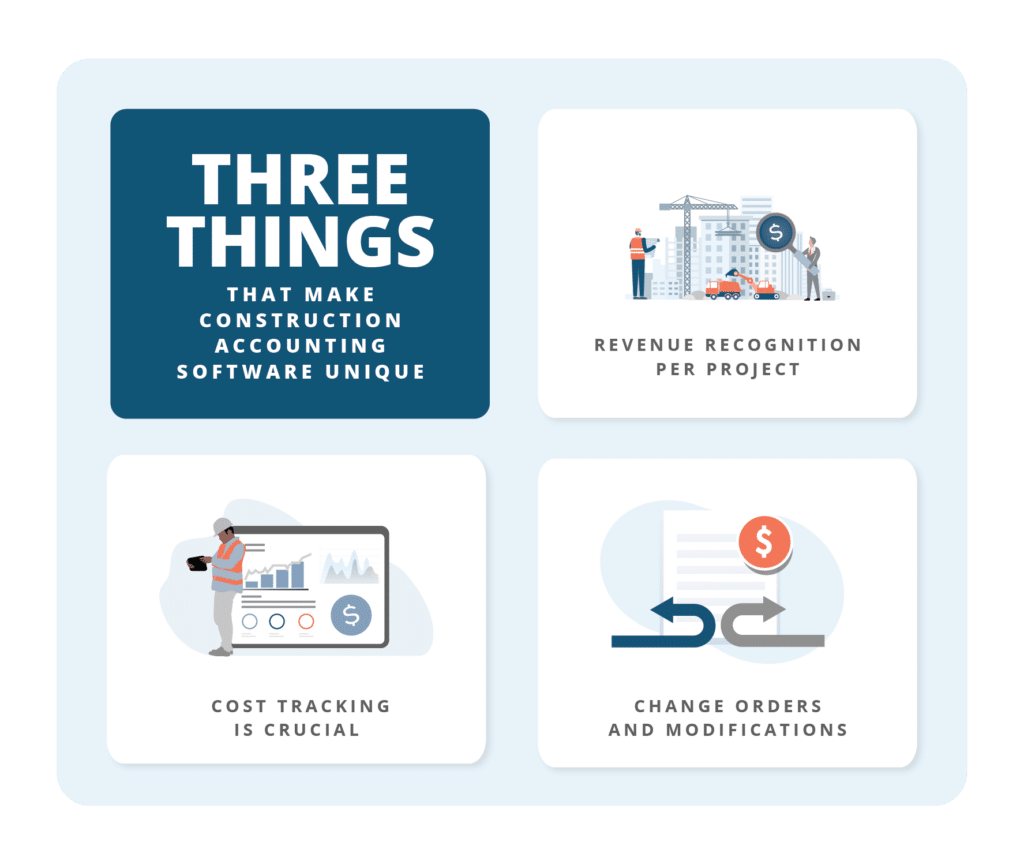
1. Revenue recognition per project
Revenue recognition in construction accounting is often tied to the percentage-of-completion method. This method provides a more accurate financial picture of long-term projects by reflecting ongoing costs and revenue, even if a project spans several years. It requires detailed project management and accounting systems to track progress, costs, and revenues accurately over the life of each project.
In contrast, financial accounting typically follows the accrual basis of accounting, recognizing revenue when earned and expenses when incurred, regardless of when cash transactions occur. However, the focus is on the financial period (e.g. quarterly or annually) rather than the completion stage of individual projects. For products or services delivered within these shorter accounting periods, revenue is recognized at the point of sale or service delivery, aligning with the fiscal calendar rather than the project timeline.
2. Cost tracking is crucial
It is highly focused on job costing, which involves tracking costs by individual construction projects. Construction companies need to know precisely how much they are spending on each job to manage cost overruns, adjust bids for future projects, and ensure profitability. This requires a detailed breakdown of expenses such as labor, materials, subcontractor costs, and equipment usage for each project.
In traditional financial accounting, the emphasis is on categorizing expenses and revenues into general ledger accounts for the overall business operations. While it also aims at tracking income and expenses, it does not require the granular level of detail per project/job as seen in construction accounting.
3. Change orders and modifications
Change orders are a common and significant aspect, reflecting modifications to the original project scope, costing, and timeline. Construction accounting must be flexible enough to accommodate these changes, tracking their impact on the project’s overall cost and profitability in real-time.
While changes in service agreements or product orders can occur, they typically do not have the same level of complexity or direct impact on the financial tracking of a single project as in construction. Financial accounting systems may need to adjust for changes in revenue or expenses, but these adjustments are generally less project-centric and more about overall business operations.
To learn more about the differences between accounting for construction and service companies versus regular accounting, let’s look at some key features you’ll find in typical construction accounting software.
Common Features of Construction Accounting Software
The key features of construction accounting software can vary greatly from one vendor to another. However, specialized accounting software developed specifically with construction in mind should have the following accounting features:
Accounts receivable: Under accounts receivables, you can manage billings payments, run customer inquiries, view customer invoices, and get accurate reporting. Managing accounts receivable by connecting AR to your jobs and work orders should make your construction and service billing easier and more efficient.
Accounts payable: In this area, you will manage your vendors and control your invoices. The reporting function under accounts payable should be designed to support your business decisions. An automated AP process that integrates your purchase orders, work orders, jobs and general ledger can eliminate errors for double data entry and improve AP processing time.
General ledger: This feature allows you to view your budget, income statements, balance sheets, and other financial management reporting needed to assess business decisions. You should be able to build and customize your chart of accounts and run financial reports monthly, quarterly, annually, or for any fiscal period with the general ledger.
Payroll: In addition to running the actual payroll, you should be able to recognize labor costs and hours. Ideally, you should be able to run certified, unionized, or non-unionized payroll so that everyone is paid on time and exactly as much as they should be. Having the payroll system integrated with job costing, work orders, equipment management, and general ledger will help you know the true state of your costs at any given moment.
Multi-company accounting: If your construction business has multiple office locations or the owner wishes to scale the business in the future, it may be important to have multi-company, inter-company, and multi-entity functionality in their construction accounting software. Having this feature in place will make it easier to manage the finances of multiple locations or divisions without needing to switch to another company database.
The Benefits of Construction Management Software WITH Accounting
Project and service managers may face many questions on the job site that can be answered quickly with timely, accurate data. When you use service and construction management software with a built-in construction accounting system, you can avoid costly delays and ill-informed decisions that can cost even more money. With construction management software, all of the work in the field and in the back office is connected seamlessly to enhance inter-office and inter-company communications and save valuable time and money in the long term. Let’s dig a little deeper into the benefits of construction management software with accounting.
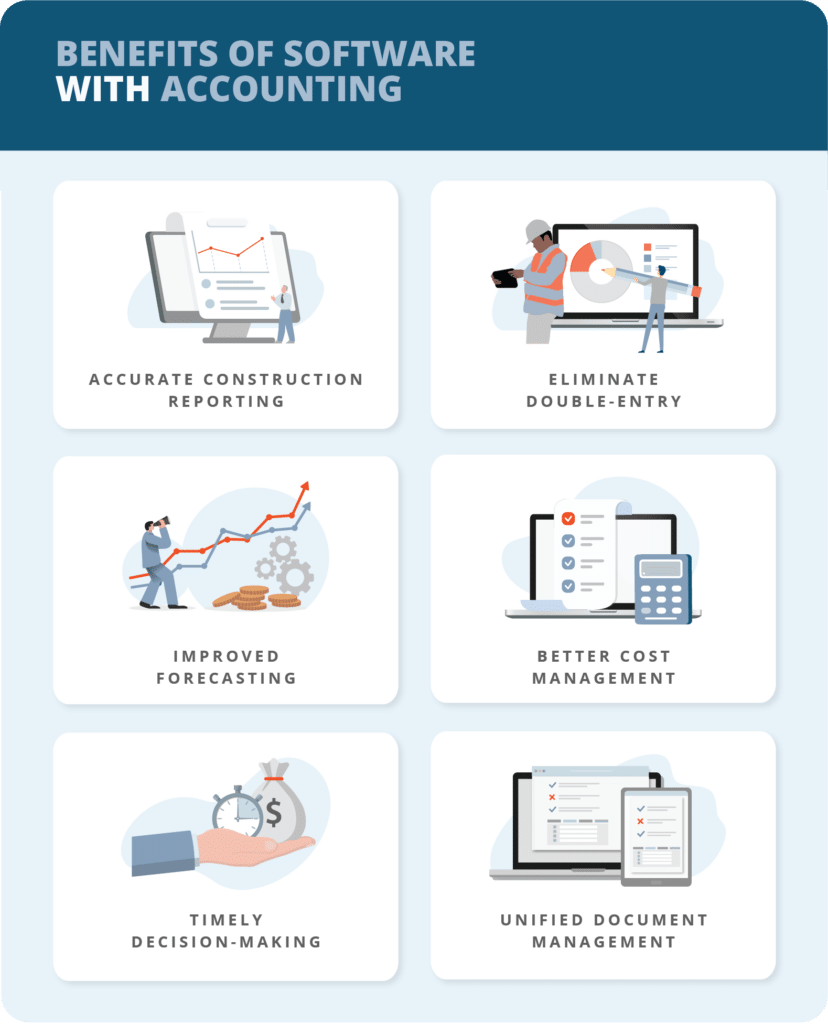
Accurate Construction Reporting
Construction management software with built-in accounting features helps in running real-time construction reports. Timely, easy-to-run reports are important in construction for a number of reasons. Firstly, reports can inform owners, project managers, and accounting staff about any unexpected challenges on a job or project. Secondly, reports enable project managers to make swift decisions that can sometimes make the difference between a successful project and one that involves additional costs from overruns and time delays.
Eliminate Double-Entry
Many construction companies use multiple systems and leverage common tools, such as spreadsheets, to share and report data between teams and departments. Office and field teams must continuously re-enter the data to ensure that information is consistent and everyone has the information they need. Such outdated business practices can impede how efficiently your business operates. Here’s how:
- Critical processes such as job costing, invoicing, and other processes are delayed since they involve data entry from two or more systems.
- Extra time and effort are involved when your staff must manually enter details and verify the information is correct.
- Information entered may be more prone to inaccuracies due to human error and re-entering data on multiple systems.
- Accounting staff and project/service managers may spend additional time to discern which data is the most up-to-date on multiple systems.
With integrated construction software ensuring a single point of entry, anyone viewing the information can quickly determine who and when information was entered and if it was inaccurately entered.
Improved Forecasting
By using construction management software with accounting modules built into the system, owners, operators, and CFOs can instantly view committed costs versus estimated expenses. By doing so, they can review their project forecasts quickly and accurately. Reliable forecasts, in turn, lead to better decision-making and may greatly improve your chances for success in your current and future jobs.
Better Cost Management
Adjusting service and construction projects and jobs without adjusting the budget is a recipe for disaster. Good accounting practices advise comparing your actual expenses against your estimates on a regular basis.
Construction management software with accounting allows you to retrieve job cost information in real time. If projects are in danger of going over budget, this real-time data helps project managers be proactive and make quick adjustments to avoid delays and cost overruns.
Timely Decision-Making
Financial data is useless if your decision-makers spend hours rummaging through folders and spreadsheets. Construction management software with accounting gives easy access to both the latest and historical data in an organized, easy-to-read format.
Project managers can confidently make data-driven decisions with access to current and accurate financial data.
Unified Document Management
Document management is an integral part of any business. From invoices, change orders to RFIs, a loss of one single document can lead to costly delays and customer dissatisfaction. That’s why managing all those vital documents in a clearly organized and efficient manner is just as important as job scheduling and equipment management. Construction management software with accounting modules digitizes the document management process and can provide the following benefits:
- Streamlined communication between teams.
- A single source of truth to eliminate misinformation.
- Access to the most recent financial data for stakeholders.
- Reduce paperwork that is prone to damage and loss.
- Reduce or completely eliminate the costs associated with storing and purchasing paper.
The benefits of construction management software with integrated accounting are numerous. The most important reason is the superior data integrity received from integrating accounting with your service and construction jobs. Once accounting is integrated into your complete business operations, data accessed in your software is more accurate and timely, which produces better reporting to make informed business decisions.
While the case for construction management software with integrated accounting seems to be the most ideal, there may be circumstances which prevent you from choosing construction management software with accounting, which is discussed in the section below.
The Benefits of Construction Management Software WITHOUT Accounting
Construction management software with a standalone accounting system may be a good option for smaller to mid-size service and construction companies with less complicated operations. Continue reading below for why a business may choose to operate their general accounting software, and under what circumstances they may want to switch to service and construction accounting software or construction management software with integrated accounting..
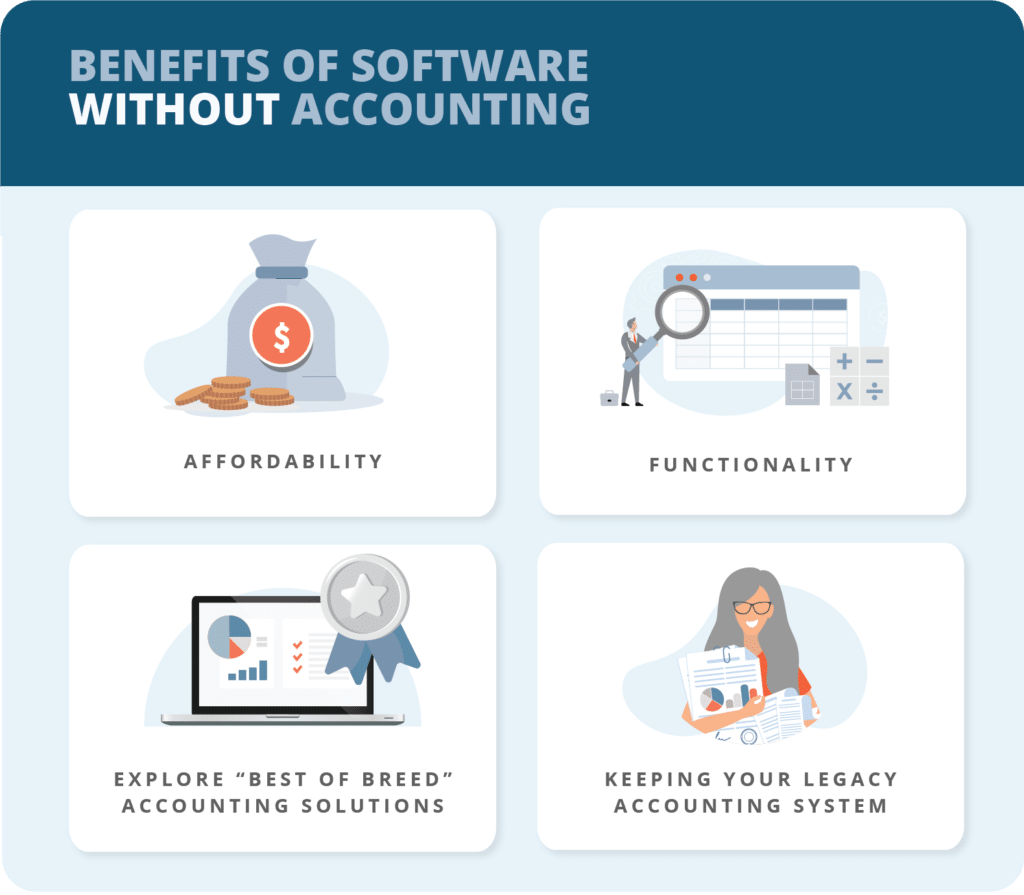
Affordability
Most construction and service businesses start with humble beginnings; you may be part of a small family-run operation or a close-knit group of under 50 employees. Regardless of where your construction company stands now, most have likely started as a financially lean operation.
It’s no surprise that in the early stages of a new venture, an owner, CEO, CFO or controller will focus solely on essential software for their business. To add an additional expense to their recurring monthly or annual fees may seem exorbitant for a small or medium-sized business, especially if they are still in the early stages of their business launch. Instead, they may opt for Excel or purchase an economical general construction accounting program to handle their bookkeeping online.
As part of the Microsoft Office suite, Excel is accessible at no additional cost to the company, and with some time invested into setting up formulas and macros for advanced calculations, your bookkeeper can generate financial reports, as well as tabulate and compare data.
When a company grows beyond the limitations of Excel for their bookkeeping and accounting needs, they may start looking at general business accounting software or construction accounting software. One of the advantages your accounting staff will notice immediately from switching to accounting software from Excel is the ease of use, as well as the time saved from eliminating spreadsheets and the manual and error-prone tasks associated with maintaining the spreadsheets.
To keep up with the latest technologies and changing construction industry, most software requires an annual or monthly fee to maintain and advance their software, as well as provide support to clients when required. While there is a cost associated with owning accounting software, it may cost less than an all-in-one construction management software system with an integrated accounting module.
In this case, it may be more cost-effective to find construction management software that can integrate with your existing accounting software. Knowing that most businesses cannot function alone on accounting software, many types of accounting software will provide fairly good integration with other business software to retain clients.
Functionality
When it comes to selecting any type of software, determining the key features and functionalities your business needs will always come first. Many general accounting software types can handle basic day-to-day business needs for small to mid-sized service and construction companies.
If you do not determine your list of must-have features prior to searching for your software, you can get overwhelmed by the endless options and features a software can provide. For example, all-in-one construction management software is great if you are looking for a system that will process a high volume of work orders and change orders from your service and construction operations. However, they may also provide features that you may not currently need.
Purchasing software where you aren’t using a majority of the features can be a waste of your investment. It may also be confusing for employees to see additional modules when they use the software. Make sure you can hide areas of the software if you don’t plan on using them.
There are also specialized types of software that offer some general construction management features but excel in one area of your business, such as service management, project management, or time management.
Depending on the type of service and/or construction business you have, you may need more functionality and features in specific areas of your business. For example, an HVAC business that manages a large number of service contracts may need more extensive features related to creating mobile work orders, field time entry, and dispatching that an all-in-one construction management software cannot provide. In such cases, integrating your independent accounting software with construction software specialized in field service management may be ideal for your business. In these situations, be sure to check that the integration between the systems is seamless.
Explore “Best of Breed” Accounting Solutions
If you have found a construction management software that has the features that you need to operate your business, you may consider exploring using a “best of breed” accounting solution. They do one thing, and one thing only – accounting. While they may be highly proficient in executing accounting processes, there may be some trade-offs to consider here as well.
Firstly, when using “best of breed” software, you’ll need to integrate using a 3rd party connection, or manually transfer data from one software to the other. Both of these options typically have a carrying cost – meaning, someone must maintain the integration to ensure your data moves from one software to the other without risking the integrity of your data.
Secondly, you’ll need to ensure that a best of breed accounting software can handle the unique accounting needs of your service and construction business.
Keeping Your Legacy Accounting System
As mentioned previously, due to affordability, many service and construction businesses use general accounting software. As a construction company grows, staff may find workarounds to offset the limitations of their general accounting software. For example, some general accounting software packages do not include payroll management functionality. With some custom development added to their accounting software, companies can achieve their accounting and financial management needs while saving time searching for other software. Moreover, they will also save time training staff and quelling resistance to the new software system.
There are many reasons construction businesses prefer to stick to their legacy accounting systems. Every construction company is different. Some businesses have their own longstanding in-house tools to handle their accounting. In many cases, staff have simply grown accustomed to its legacy accounting tool, and even with its limitations, they would prefer to remain on their legacy software rather than finding and learning a new one.
If your back office operations are continuously suffering from inaccurate and outdated data and reporting, it may be time to start evaluating your business’ accounting and financial needs to assess if the business should switch to a more robust software solution.
Construction Management Software: With or Without Accounting
The question of whether you need construction management software with or without accounting functionality greatly depends on your business goals and size, as well as the scope of your operations. If you have a small number of projects or projects that typically have similar costs, you may be able to overcome the limitations of general accounting software by implementing some workarounds and integrations. This can be both cost-effective and efficient for your staff and business until your business needs to grow beyond your legacy software. That said, consider that managing software with integrations may also be a risky and costly endeavor, should you need to deal with two businesses as opposed to one.
However, if you’re an accountant who aims to keep up with technology to stay on top of your competition, then you may lean more towards construction software with accounting. For larger service and construction businesses or businesses with plans to scale up, construction management software with accounting is essentially a must. Consider that you can connect the field to the back office, all offices, departments, and processes in one system.
Accounting can essentially handle more work without needing to increase staff by taking advantage of the automated processes in construction management software. Construction businesses that have numerous projects happening at the same time, sometimes in different cities and even countries, need accounting to be an integral part of their project management.
Having a fully integrated system to connect the accounting and office staff with field staff is critical for expediting billings, invoicing, managing payroll processing, and most importantly, financial reporting. Moreover, centralizing all communications and documents related to jobs and projects in one robust system will enhance business efficiency and help larger businesses establish themselves for long-term success.
Featured Resource: The Definitive Guide to Accounting for Construction Companies
How Jonas Construction Software Can Help
If you’re looking for construction management software with an integrated accounting module, consider Jonas Construction Software.
Jonas Construction is a fully integrated construction management and accounting solution that can help you streamline and track business processes in the office and in the field. Improve interdepartmental communications by syncing your day-to-day tasks and activities, providing a shared, accessible space on all jobs, services, and projects.
With the integration of areas like accounting, project management, service management, inventory and document management, and dispatch scheduling, the delivery of well-executed construction projects and/or services can be greatly improved.
If you’re ready to enhance the profitability and scalability of your construction business, request a demo today!




